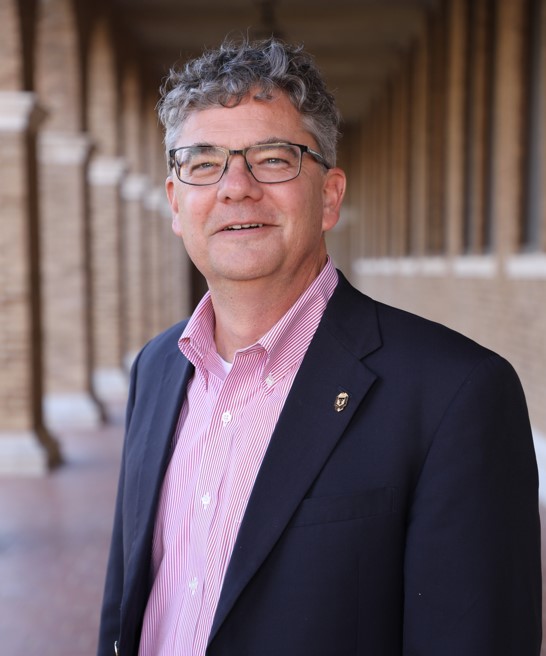Chair's Welcome
Welcome to the Department of Civil, Environmental, and Construction Engineering (CECE) at Texas Tech.
On the advent of the University's 100th anniversary, I am honored to serve as the Chair. The CECE department has played an important role in the evolution of the Edward E. Whitacre Jr. College of Engineering and Texas Tech, and will continue to be a leader in the delivery of the highest quality engineering education and conducting national and international research that improves civilization. As a faculty member in the department for over 24 years, I personally know the profound impact the department has had on both the lives and careers of our graduates as well as the impact its research has made, and I am excited to lead the department into the next 100 years of educational and research excellence.
The department consists of three programs and multiple focus areas. We offer ABET accredited degrees in Civil, Construction and Environmental Engineering as well as master’s and doctoral degrees in Civil Engineering with focuses in the areas of structures, geotechnical, materials, transportation, construction, water resources, and environmental engineering. In addition, the department is one of only a handful nationwide and one of the first to offer a direct freshman to masters ABET accredited environmental engineering degree (MENVE). Members of the department also founded the Wind Engineering and Science program, in which students may obtain a doctorate. We are also offering an increasing number of graduate courses on-line to enable professionals and non-traditional students to obtain advanced degrees while continuing to practice.
For in residence students, we are proud to support multiple student organizations including the student chapters of the American Society of Civil Engineers and Texas Water Environment Federation as well as the Chi Epsilon honor society. Students in our program also participate in other interdepartmental organizations such as the Society of Women Engineers, the Society of Hispanic engineers, the National Society of Black Engineers, and Engineers with Borders.
Research conducted in the department includes all traditional focus areas as well as cutting edge research in many areas. Examples include: 1) natural hazards engineering that tackles problems such as performance-based design of high-rise-buildings and long-span-bridges for extreme winds; multi-hazard sustainability (earthquake engineering, climate change, and probabilistic sea-level rise hazard analysis); 2) physical-digital models and large scale statistical learning applications in water resources; 3) cutting-edge lidar application in infrastructure-based traffic and pedestrian detection to assist all-user-in-the-loop, cooperative driving automation; 4) bioinspired molecular based adsorbents and custom nano-materials for water purification, fate of PFAS (forever chemicals), and biological recovery of nutrients for fertilizer production; and 5) innovative materials for infrastructure construction and repairs, to list only a few.
The department is in the process of hiring multiple new faculty, which is an extraordinary opportunity to further broaden the research conducted and address the upcoming societal challenges. I invite you to look through our website and discover the exciting research being conducted.
My goal as chair is to continue the tradition of educational excellence and research while broadening the departments educational opportunities and increasing the impact of its research while enabling full participation of all individuals. I welcome your input and encourage you to reach out and be a part of the exciting activities in the department.
W. Andrew Jackson, Ph.D., P.E., BCEE, F.AAAS

Professor and Department Chair
806.742.3449
andrew.jackson@ttu.edu
Dr. Andrew Jackson is a Presidents Excellence in Research Professor and Provost’s Integrated Scholar in the Department of Civil Environmental and Construction Engineering at Texas Tech University. Andrew received his B.S. degree in Biology from Rhodes College and a M.S. and Ph.D. from Louisiana State University in Engineering Science with an emphasis in Environmental Engineering. He is a board-certified environmental engineer and a fellow of the American Association for the Advancement of Science. His research interests include evaluating the fate and transport of a variety of contaminants in natural environments, including: perchlorate, heavy metals, explosives, PFAS, and chlorinated solvents, along with the development of methods to study these processes at appropriate scales. His work focuses on understanding how biogeochemistry controls the fate of contaminants as how it can be manipulated to remediate contaminated sites. He has also been actively developing biological reactors for recycling of space habitation waste streams in closed loop life support systems and their applications for terrestrial nutrient control. His research activities include a mix of field work, both nationally and internationally (Antarctica), and laboratory studies. His research spans the spectrum of pure science (e.g. perchlorate formation on Mars) to the very applied (e.g. development of direct drive passive samplers). He has published over 100 journal publications and book chapters with more than 3000 citations. In the last two years, Andrew has served as a principal or co-principal investigator on grants sponsored by a variety of agencies including DOE, ESTCP, NASA, Battelle, and Oregon DEQ. He has served on several project advisory boards and is active in the American Chemistry Society and American Association of Environmental Engineering and Science Professors. He has been recognized with several University and International awards including Environmental Science and Technology’s best paper of the year (2005), the ICES award (2018); Barnie Rushing Distinguished Research Award, and Presidents Excellence in Teaching Award
Department of Civil, Environmental & Construction Engineering
-
Address
Texas Tech University, Box 41023 | Lubbock, TX 79409−1023 -
Phone
806.742.3523 -
Email
cece@ttu.edu
